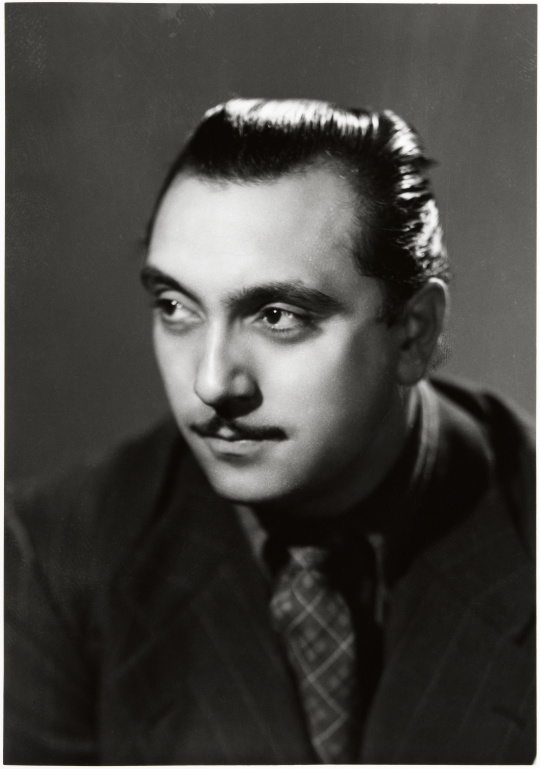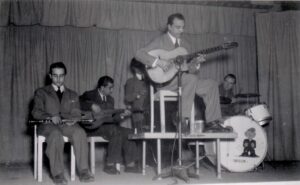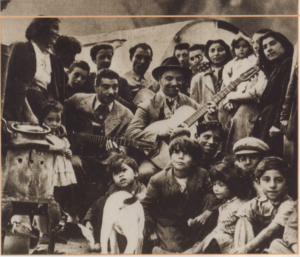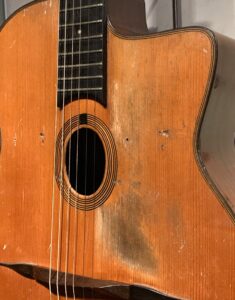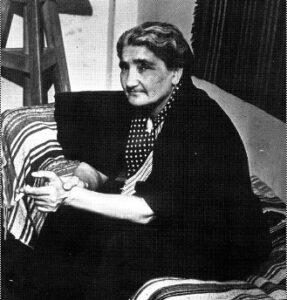The Guitar Genius
Django Reinhardt, born on January 23, 1910, in a caravan in the Belgian village of Liberchies, would go on to become one of the most revered and influential guitarists in the history of jazz. Born into a family of Manouche Gypsies, Django’s upbringing immersed him in a world filled with vibrant music and rhythmic traditions.
From a young age, Django’s passion for music was kindled by his father, Jean Eugène Weiss, a skilled musician, and his mother, Laurence “Negros” Reinhardt, a dancer. It was within this rich musical environment that Django’s journey as a musician began to take shape.
Starting with the violin, Django learned from his father and uncles, developing a solid foundation in melody and technique. However, it was his encounters with banjoists Auguste “Gusti” Malha and Jean “Poulette” Castro that would prove pivotal in his musical development. Under their guidance, Django quickly adapted his skills to the banjo, embarking on a musical partnership with his brother Joseph “Nin-nin,” playing together in cafes across Monparnasse and the Clignancourt flea market.
In 1922, Django’s prodigious talent caught the attention of Vétèse Guérino, an esteemed accordionist and bandleader. Despite being only 12 years old, Django joined Guérino’s band, marking the beginning of his professional career and setting him on a path towards musical greatness.
In 1928, tragedy struck when a fire engulfed Django’s caravan, severely damaging his left hand. Undeterred by this setback, Django embarked on a miraculous journey of recovery and adaptation. With only two functional fingers on his left hand, he developed a groundbreaking technique that revolutionized guitar playing. His innovative approach, characterized by intricate chord voicings and lightning-fast single-note runs, became his signature style, setting him apart as a true musical pioneer.
Django’s rise to prominence accelerated with the formation of the Hot Club of France in 1932, where he encountered violinist Stéphane Grappelli. Their musical synergy was instantaneous, and their collaboration birthed a groundbreaking sound that blended Django’s unparalleled guitar skills with Grappelli’s virtuosic violin playing. Together, they formed the Quintette du Hot Club de France, captivating audiences with their energetic performances and innovative improvisations.
Throughout his career, Django recorded a vast repertoire of songs, leaving behind a remarkable discography that showcases his extraordinary talent and creativity. Collaborations with esteemed musicians, including the Ferret brothers—Sarane and Baro—further solidified Django’s position as a luminary in the jazz world.
Django Reinhardt’s playing style was characterized by his remarkable dexterity, lightning-fast runs, and soulful phrasing. His virtuosity on the guitar was unparalleled, and he possessed an innate ability to seamlessly blend traditional jazz with his Romani roots, creating a genre known as Gypsy Jazz or “Jazz Manouche.” Django’s music exuded an irresistible energy, captivating listeners with its infectious rhythm and melodic complexity.
Django Reinhardt’s life and legacy extended far beyond his groundbreaking contributions to Gypsy jazz. His influence transcends generations, inspiring countless musicians to push the boundaries of their artistry. Even after his passing, Django’s impact remains profound, with his name synonymous with genius and innovation in the world of guitar.
Django Reinhardt’s indelible mark on music continues to captivate audiences worldwide. His unparalleled talent, unyielding spirit, and relentless pursuit of musical excellence have secured his place in the pantheon of guitar legends. Django’s legacy serves as a testament to the power of music to transcend barriers and touch the hearts and souls of listeners around the globe.
